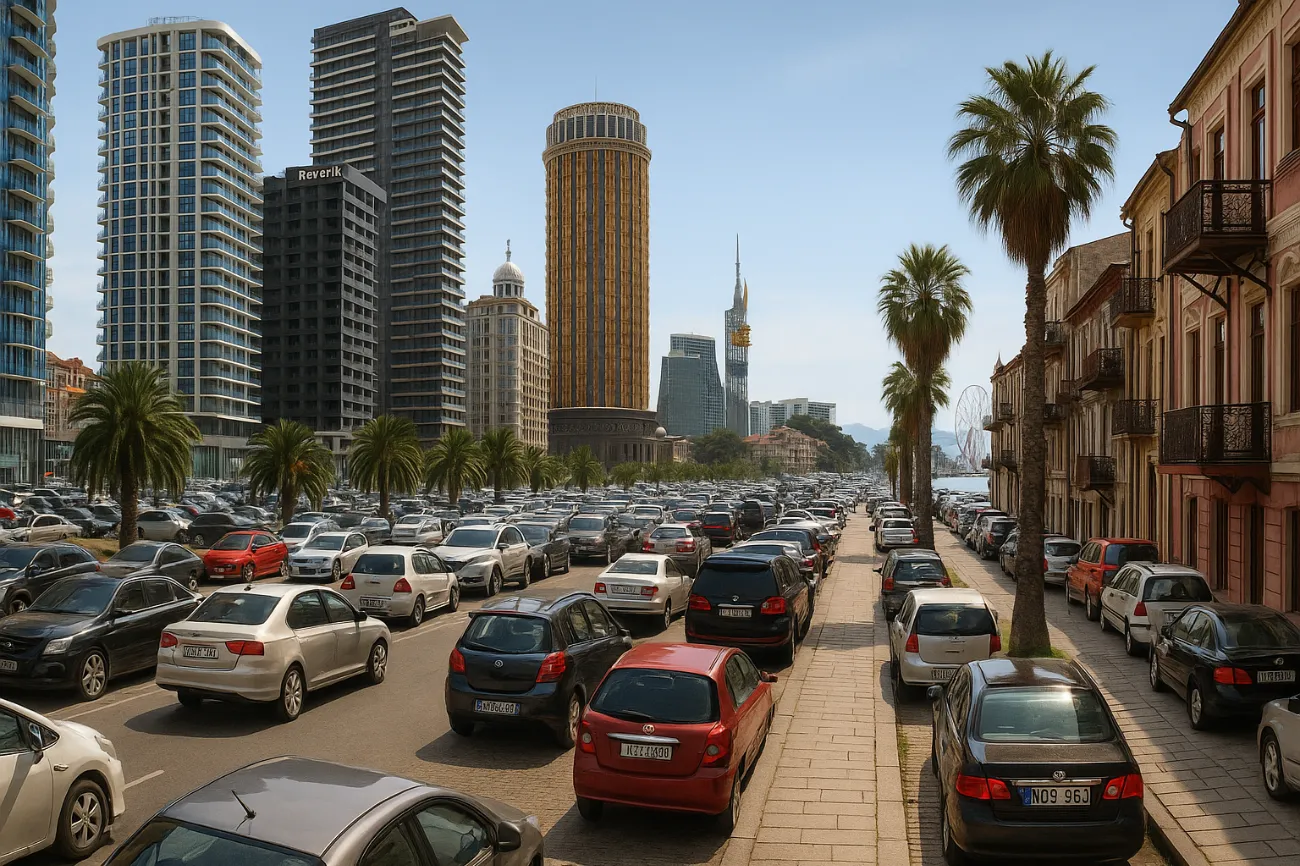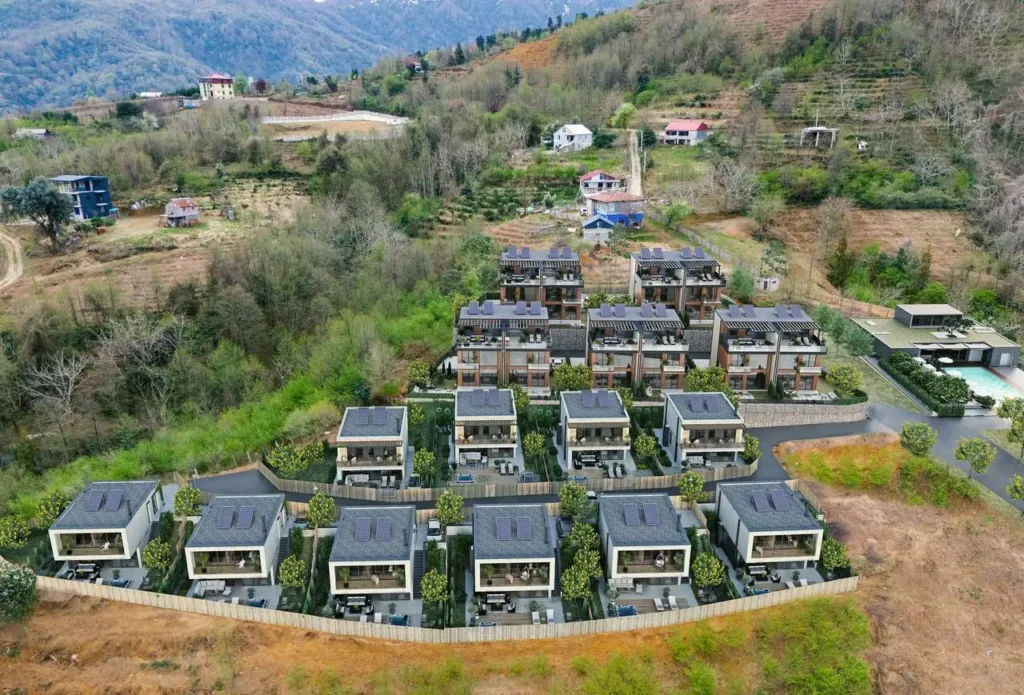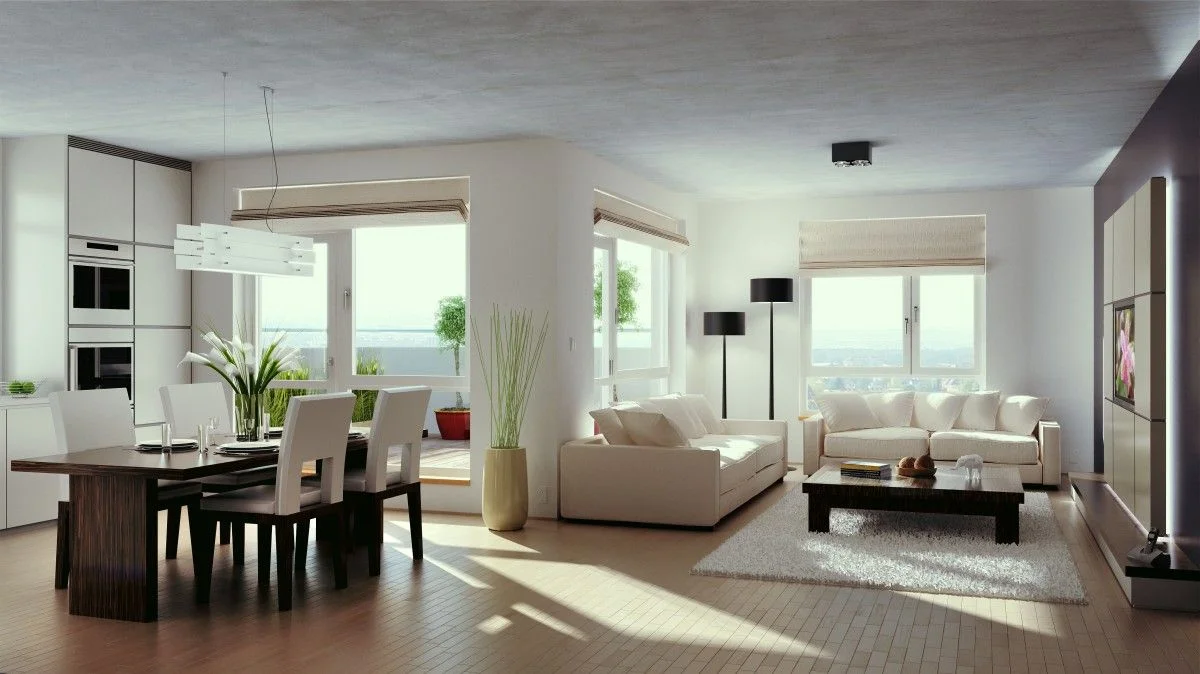Batumi is not just Georgia's second most populous city, but also a dynamically developing seaport on the Black Sea. Every year it attracts the attention of tourists and investors more and more. As the Mayor of Batumi noted, the city has become "a fast-growing tourist hub and transit route". However, with the increasing number of residents and visitors, Batumi faces serious transport challenges.
The influx of cars is creating constant traffic jamsespecially in the central districts, and causes an acute shortage of car parks. This situation not only affects the quality of life of the citizens, but also the property investment appeal in the region. In this article we will look at the main transport problems in Batumi, measures to solve them and how they affect property investment.
A street in the centre of Batumi: dense urban development and traffic flows
Batumi's modern transport system is under considerable strain with the rapid growth in the number of cars. Narrow streets and old thoroughfares, which used to cope with the flow of traffic not so long ago, have now become the cause of regular congestion. This is particularly noticeable in the central districts, where the density of buildings and traffic flows create constant congestion. plugs.
Transport network issues
Batumi's transport network faces a number of serious challenges that require an integrated approach to address them. The main challenges include:
- Regular traffic jams: Batumi's streets, especially in the centre and on outbound routes, regularly suffer from traffic jams. These traffic jams not only slow down movement, but also have a negative impact on the city's ecology.
- Lack of spacious and comfortable buses: Until 2020, the city operated many cramped shuttle buses that could not meet the needs of the growing population. Despite the purchase of new buses, their number is still insufficient to fully cover the transport needs of the city.
- Lack of public car parks: There is a shortage of parking spaces in large developments, resulting in chaotic on-street parking and creating additional difficulties for drivers.
- Lack of rapid transport: Batumi has no metro or other forms of rapid transport, which limits the ability to move quickly around the city.
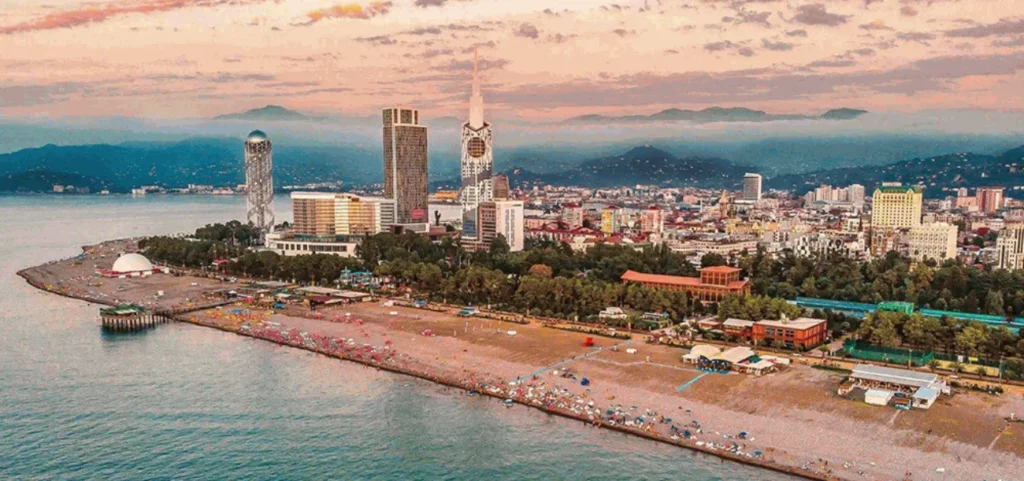
Improvement measures
To solve Batumi's transport problems, the city authorities and international organisations are taking a number of strategic steps. The main measures include:
- Procurement of environmentally friendly buses: As part of the modernisation of the transport fleet, low- and zero-emission buses were purchased. This not only reduces the number of old minibuses, but also improves the environmental situation in the city.
- Intelligent traffic management systems: The introduction of "smart" traffic lights with AI control at key intersections helps to optimise traffic flows and reduce congestion. This is especially important for central districts, where traffic jams are most noticeable.
- Development of a Master Plan for the development of the city: This plan takes into account the principles of green and safe transport to create a sustainable transport system. In the long term, it is planned to expand the network of bicycle lanes and improve the pedestrian infrastructure.
- Optimisation of the street network: There are plans to revise and improve traffic patterns, which should increase road capacity and reduce congestion. However, the timing of these initiatives is still uncertain.
- Development of public transport: The introduction of dedicated bus lanes on major routes and improving the city's public transport coverage remain priorities. This will reduce residents' dependence on private cars and improve transport accessibility.
These measures demonstrate Batumi's commitment to developing a modern and efficient transport system, which in turn enhances the development of a modern and efficient transport system. investment attractiveness of the city and improves the quality of life of its residents.
Parking problems in Batumi
The parking situation in Batumi remains one of the most acute problems, especially in the city centre districts. In the courtyards of Old Batumi cars are often parked close to houses, which creates inconvenience for residents and pedestrians. The lack of official parking spaces leads to cars occupying pavements and even footpaths.
The main aspects of the problem:
Lack of space
- Lack of multi-level car parks: Despite the growing demand, the construction of multi-level car parks is virtually non-existent. This leads to cars parking on streets, occupying pavements and creating congestion.
- Designing new buildings: Many new residential developments are initially designed with minimal or no parking spaces. This creates additional difficulties for residents, who are forced to find alternative parking options.
- Dense development: In the city centre districts such as Old BatumiThe dense development makes it impossible to create new parking zones. This aggravates the situation and forces motorists to leave their cars in unauthorised places.
Consequences of the lack of seats:
- Increased traffic congestion: The shortage of parking spaces causes drivers to spend more time searching for a free space, which increases the plugs and worsens transport accessibility.
- Parking violations: With shortages, drivers often break the rules by leaving cars on pavements and cycleways, causing additional problems for pedestrians and cyclists.
- Reduced quality of life: Persistent parking difficulties reduce the quality of life for city dwellers and can have a negative impact on the investment attractiveness real estate.
To solve these problems, comprehensive measures are needed, including the construction of new parking facilities and revision of urban planning regulations. This will improve the situation and create more comfortable conditions for residents and guests of Batumi.
Expensive paid parking
In Batumi, the parking problem is exacerbated not only by a shortage of spaces, but also by the high cost of renting existing parking spaces. Expensive paid parking becomes a serious barrier for many residents and visitors, which in turn affects transport accessibility and overall quality of life.
The main aspects of the problem:
- Rising rental prices: With a shortage of parking spaces, the cost of renting parking spaces has increased significantly. Often the price per space can rival the rent for a small flat, making it unaffordable for many residents.
- Separate sale of car parking spaces: Developers often offer parking spaces separately from the flats, which requires additional financial investment from buyers. This increases the total cost of acquiring a property and may discourage potential investors.
- Impact on the property market: The high cost of parking affects the investment attractiveness of properties. For investors, this means additional costs that they have to take into account when planning property investments.
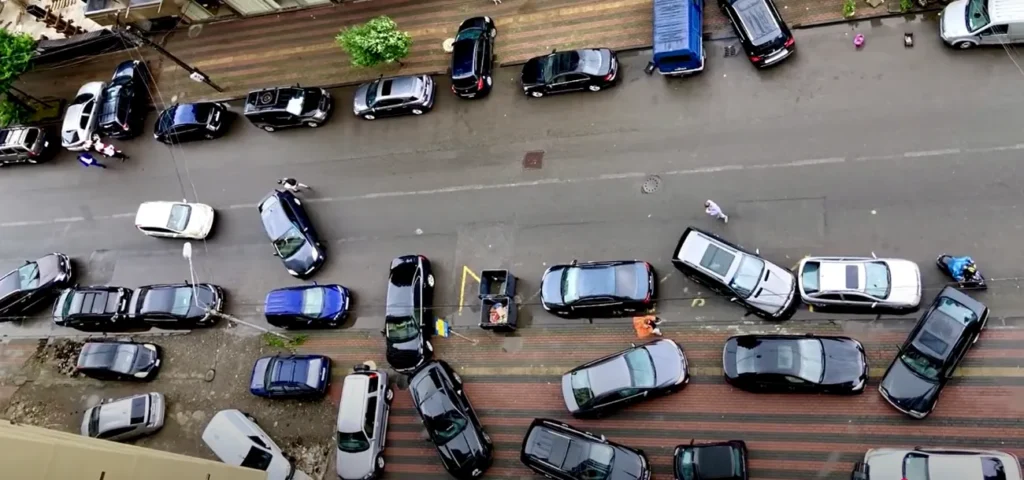
Consequences of expensive car parking:
- Reduced housing affordability: High car parking prices make housing less affordable and attractive to tenants, which can reduce the flat yield.
- Parking violations: Unable to pay for parking, drivers often leave their cars in unauthorised places, which creates additional difficulties for the city's infrastructure.
- Deterioration of the urban environment: Expensive and insufficient parking spaces lead to spontaneous parking, which deteriorates the quality of the urban environment and creates discomfort for residents.
Comprehensive measures are needed to address the problem, including the development of more accessible parking solutions and the introduction of modern parking management technologies. This will improve transport accessibility and increase investment attractiveness Batumi.
Low penalty policy
One of the key problems exacerbating the parking situation in Batumi is an insufficiently strict fine policy. Low fines for parking violations do not provide sufficient incentives for compliance, contributing to chaotic parking and increased traffic problems.
The main aspects of the problem:
- Inadequate fines: Currently, fines for parking on pavements, without paying or in other prohibited places are around GEL 10 (≈$3-4). This amount is insignificant for many car owners and does not deter them from breaking the rules.
- Low effectiveness of the measures: Due to insignificant fines, drivers continue to ignore the rules, expecting that the possible costs will be minimal. This leads to an increase in the number of violations and worsens the situation on the roads.
- Lack of a control system: Insufficient system of control and monitoring of compliance with parking rules also plays its role. This allows violators to avoid responsibility and continue to leave cars in places inconvenient for others.
Consequences of a low penalty policy:
- Increased offences: Low fines contribute to an increase in the number of violations and create additional burdens on city infrastructure.
- Deterioration of transport accessibility: Chaotic parking impedes traffic and worsens accessibility, which has a negative impact on the overall quality of life in the city.
- Decrease in investment attractiveness: Failure to ensure parking is in order reduces the attractiveness of the city for investors and can have a negative impact on the property market.
To improve the situation, it is necessary to revise the penalty policy, making it stricter and more effective. This will reduce the number of offences and improve transport accessibility, which in turn will increase the investment attractiveness Batumi.
Impact on the urban environment:
The parking situation in Batumi remains one of the most acute, affecting the quality of life of residents and visitors. The main parking problems require a comprehensive approach to solve.
Deterioration in quality of life:
Constant parking problems create stress and inconvenience for residents, which negatively affects the overall quality of life in Batumi.
Decrease in investment attractiveness:
Failure to ensure parking is in order reduces the attractiveness of the city for investors and can have a negative impact on the property market.
To address these problems, it is necessary to introduce comprehensive measures, including infrastructure development, improvement of the control system and revision of the penalty policy. This will help to create more comfortable living conditions and increase the investment attractiveness Batumi.
Transport infrastructure and investment attractiveness
Transport infrastructure plays a key role in shaping Batumi's investment attractiveness. Convenience of transport connections and availability of parking spaces have a significant impact on the property market, making certain areas more attractive for investors and buyers.
Residential property
Residential property in Batumi is a dynamically developing sector that actively attracts the attention of both local and foreign investors. Transport accessibility and availability of parking spaces have a significant impact on the cost and attractiveness of housing in different parts of the city.
Key Aspects:
- The value of car parking spaces:
Flats with dedicated parking spaces in prestigious areas, such as the centre of Batumi or Nobel Alley, have a higher price. Availability of parking becomes an important factor when choosing housing, especially for families and people who use personal transport. - The impact of transport infrastructure:
Convenient access to public transport and major road arteries increase the attractiveness of residential property for tenants. Housing located near new bus routes or cycleways is in high demand. - Investment attractiveness:
Investors should consider transport and parking aspects when selecting investment sites. Properties in areas with developed infrastructure and plans for its improvement promise higher returns and stability.
Batumi facilities
Long-term perspectives:
- Rising prices:
With the improvement of transport infrastructure and the development of new projects, residential property prices are expected to rise. This makes current investments in housing particularly promising. - Environmental Initiatives:
A focus on green transport and eco-friendly neighbourhoods can attract sustainability-minded tenants. This opens up additional opportunities for investors.
In conclusion, residential property in Batumi represents an attractive investment opportunity. Comprehensive development of transport infrastructure and improved parking conditions create favourable conditions for value growth and increase of investment attractiveness housing in the future.
Commercial property
Commercial property in Batumi plays a key role in the economic development of the city, attracting the attention of both local and international investors. Transport accessibility and availability of parking spaces are critical factors affecting the success and attractiveness of commercial properties.
Key Aspects:
- Transport accessibility:
For commercial properties such as offices, shops and restaurants, convenient access to the transport network is crucial. Proximity to major roads and public transport stops increases the flow of customers and improves the attractiveness of the business. - Availability of car parking spaces:
Customer car parks are essential to the successful operation of commercial properties. Lack of parking spaces may lead to a decrease in attendance and negatively affect the business. Investors should take this aspect into account when selecting sites for investment. - Infrastructure impact:
The development of transport infrastructure, including new roads and improved public transport, is driving up commercial property prices. Properties located in areas with active development offer higher yields.
Long-term perspectives:
- Rising prices and demand:
With improved transport infrastructure, demand for commercial property is expected to increase. This opens up opportunities for price growth and higher returns on investment. - Environmental initiatives and sustainable development:
The introduction of environmentally friendly transport solutions and the development of green neighbourhoods can attract sustainability-oriented businesses, further enhancing the attractiveness of commercial property.
In conclusion, commercial property in Batumi represents a promising sector for investment. Improved transport accessibility and infrastructure development create favourable conditions for growth and business success, making the city attractive for commercial investment.
State initiatives and development prospects
In recent years, Batumi has been actively working to improve its transport infrastructure, which is an important step to improve the quality of life and investment attractiveness of the city. Government initiatives are aimed at solving existing problems and creating a sustainable transport system.
Key initiatives:
Infrastructure projects:
The introduction of "smart" traffic lights at busy intersections and improved road links are helping to optimise traffic flows. The Asian Development Bank is financing the construction of a bypass road around Batumi, which should reduce truck traffic through the city centre by 60%.
Update on public transport:
The city received grants to purchase electric and low-emission buses. The first electric bus line connecting the airport, city centre and railway station demonstrates new technologies for the region. These measures reduce the number of mini-buses and contribute to environmental improvements.
Social programmes:
Since 2022, municipal buses have been free for students, schoolchildren, pensioners and socially disadvantaged citizens. This reduces the burden on personal transport and makes the city more accessible.
Town planning regulation:
City Hall has tightened building regulations. From 2019 to 2022, the number of building permits issued has dropped dramatically (from 582 in 2019 to 175 in 2021) because of the new rules. Now every new building must comply with the city's master plan and take into account transport and parking needs.
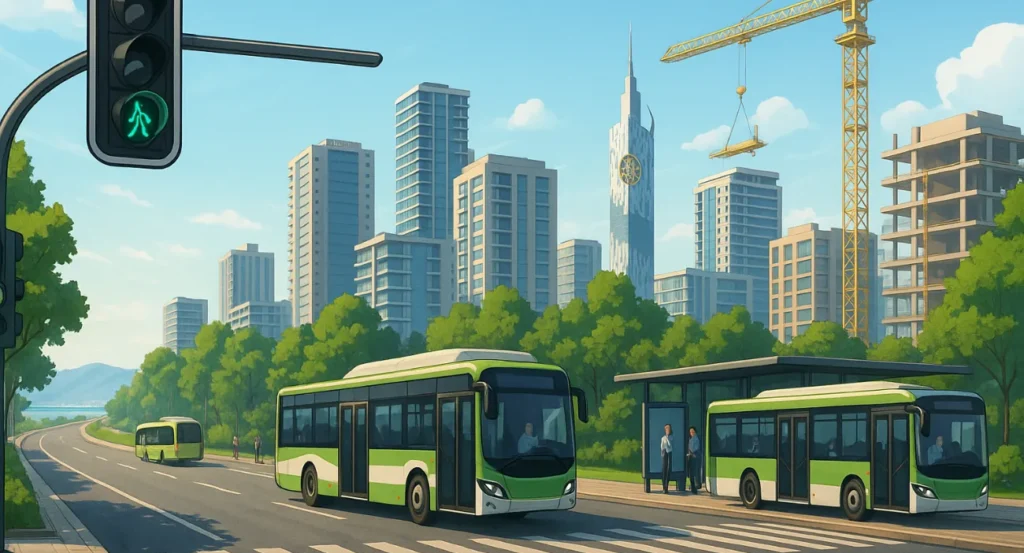
Development Prospects:
Comprehensive Measures:
Reducing the load on the centre through bypass roads, creating multi-level car parks and introducing electronic parking payment systems can significantly improve the traffic situation.
Investment attractiveness:
Areas where road and public transport development plans are being implemented can become particularly promising for investors. Active urban policy and green initiatives will gradually change the situation, making Batumi a more accessible and comfortable city.
Thus, government initiatives and development projects play a key role in shaping the future shape of Batumi. They not only solve current problems, but also lay the foundations for sustainable growth and improvement. investment attractiveness of the city.
Conclusions
Batumi's transport and parking infrastructure today faces serious challenges that require a comprehensive and strategic approach. Congestion and lack of parking spaces negatively affect the quality of life of citizens and reduce the investment attractiveness of the city. However, significant steps are already being taken to address these problems.
- The need for modernisation:
Batumi's modern transport system requires modernisation. The introduction of intelligent traffic management systems and the renewal of public transport are important steps towards improving the situation. - Parking Problems:
The lack of organised parking spaces and high rental costs remain key challenges. The construction of multi-level car parks and revision of fine policies are needed to address them. - State Initiatives:
Active infrastructure measures, such as the construction of bypass roads and renewal of the transport fleet, are laying the foundation for sustainable growth in the city. - Investment attractiveness:
Improvements in transport accessibility and parking infrastructure make neighbourhoods more attractive to investors. Sites in areas with planned infrastructure development may become particularly promising.
In conclusion, Batumi is on its way to significant changes aimed at improving transport and parking infrastructure. These efforts have the potential not only to improve the quality of life for residents, but also to make the city more attractive to investors. A comprehensive approach to solving existing problems and implementing strategic initiatives will ensure Batumi's sustainable development and prosperity in the future.
